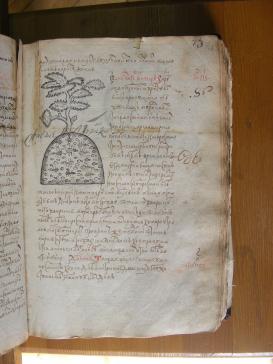In 1645, the dying Tsar Mikhail Romanov was examined by his German doctors and prescribed, via Latin instructions, Chinese rhubarb, Alexandrine Senna, local juniper berries, unicorn horn, and American sassafras, a treatment recorded in exacting detail by Russian bureaucrats in Russian. Such a circumstance might seem odd. Works on early modern science and medicine commonly present the Russian empire as isolated, if they devote any space to the region at all. On the contrary, the Russian court imported its official medicine from Western Europe, recruiting experts and sourcing texts and supplies from its major diplomatic and trading partners. The treatment of Mikhail Fedorovich demonstrates Russia’s wider medical links. Indeed, the combination of medicaments from across the early modern world and the use of multiple languages in this case was an entirely normal occurrence at the early modern Russian court.
My project considers the various aspects of translating drugs through the life-cycle of a drug. It examines the physical translation of drugs through trade networks; the transformation of natural objects into medicines; and the translation of recipes between German, Latin, and Russian. The project, which is the first study of Russia’s involvement in the early modern global drugs trade, offers a new view on the geography of early modern science by bringing together trade, pharmacy, the state, and translation.
This work is located on the intersection of two major historiographical threads in the history of science: globalization and knowledge exchange. The nature and chronology of the global has been a controversial topic for some time, with the early modern period being one era attracting particular attention due to the near-simultaneous inception of European–American interaction and development of more intensive European–East Asian contact. As medical drugs were the subject not only of trade, but also of medical writings and ideas about the natural world, they provide an ideal opportunity to reexamine early modern globalization. Russian drug records allow particular insight into the global, as they demonstrate a long-term and long-distance trade that had a substantial impact upon the lives not only of the elite but of ordinary sufferers, broadening our understanding of early modern globalization from an economic issue to a social and cultural phenomenon.
Knowledge exchange, and the related terms knowledge transmission and knowledge circulation, have similarly fraught historiographies, being associated in particular with the problematic idea of an interaction between “center” and “periphery.” The Russian Empire is itself usually presented as a periphery to Western Europe. Knowledge exchange was a key concern at the Russian court, as experts, bureaucrats, and patients were writing and speaking in Russian, Latin, German, English, and Dutch. Attention to Russian medical records and books reveals a complex interaction between local healers and patients, foreign experts, and Russian translators and bureaucrats, presenting an opportunity to decenter knowledge exchange debates while simultaneously highlighting the often undervalued importance of language and translation.

